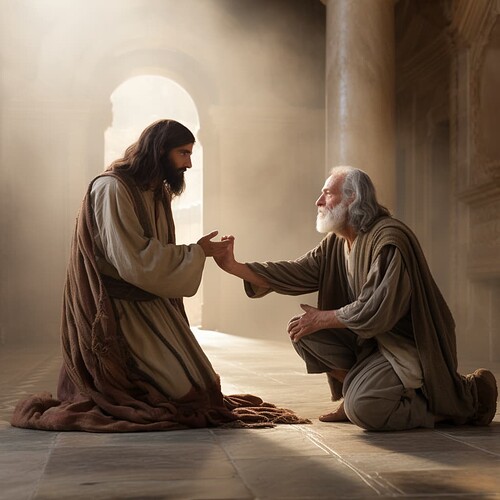 January 10: Reflections on Matthew 12: Controversies and Kingdom Parables
January 10: Reflections on Matthew 12: Controversies and Kingdom Parables
Understanding Jesus’ Teachings on the Sabbath and the Kingdom of God
 Introduction
Introduction
In our journey through the Gospel of Matthew, we arrive at chapter 12, a passage rich with controversy, instruction, and insight into the heart of Jesus’ teachings. Here, we encounter stories that challenge religious legalism and reveal the nature of Jesus’ messianic mission.
 Matthew 12: Jesus, Lord of the Sabbath
Matthew 12: Jesus, Lord of the Sabbath
Matthew 12 presents a series of confrontations between Jesus and the Pharisees, particularly over the observance of the Sabbath. Jesus heals on the Sabbath and proclaims Himself “Lord of the Sabbath,” challenging the Pharisees’ narrow interpretation of the law and highlighting His authority over religious traditions.
Key Verse: “For the Son of Man is Lord of the Sabbath.” — Matthew 12:8
 The Parables of the Kingdom
The Parables of the Kingdom
This chapter also features Jesus teaching in parables, using everyday images to reveal truths about the Kingdom of God. The parables illustrate the nature of God’s Kingdom as growing and inclusive, contrasting with the exclusive legalism of the religious leaders.
Key Verse: “He told them another parable: ‘The kingdom of heaven is like a mustard seed, which a man took and planted in his field.’” — Matthew 13:31 (Note: This verse is from the next chapter but ties into the theme of parables about the Kingdom)
 Key Themes and Reflections:
Key Themes and Reflections:
Sabbath and Mercy: Matthew 12 emphasizes the spirit of the law over the letter, focusing on mercy rather than sacrifice.
Kingdom Parables: The parables in this chapter reveal the Kingdom of God as dynamic and transformative, contrasting with static religious systems.
Jesus’ Identity: The chapter underscores Jesus’ identity as the Messiah and His authority to interpret the law.
 Today’s Application:
Today’s Application:
Reflect on the importance of internalizing the spirit of God’s commands rather than adhering to external regulations. Consider what the parables teach us about the inclusive and transformative nature of the Kingdom of God.
 Hidden Gem:
Hidden Gem:
Did you know? Matthew 12 includes a reference to the prophet Jonah, linking Jesus’ ministry to Jonah’s three days in the belly of the whale, foreshadowing Jesus’ resurrection.
 Reflective Q&A:
Reflective Q&A:
![]() Matthew 12: Jesus, Lord of the Sabbath
Matthew 12: Jesus, Lord of the Sabbath
![]() Sabbath Controversies: What do Jesus’ actions and words regarding the Sabbath reveal about His approach to religious practice?
Sabbath Controversies: What do Jesus’ actions and words regarding the Sabbath reveal about His approach to religious practice?
A: Jesus’ approach to the Sabbath highlights the priority of compassion and human need over ritual compliance. His actions assert that religious practices should serve humanity, not enslave them.
![]() Authority of Jesus: How does Jesus demonstrate His authority over traditional interpretations of the law?
Authority of Jesus: How does Jesus demonstrate His authority over traditional interpretations of the law?
A: By healing and teaching on the Sabbath, Jesus asserts His divine authority to fulfill and properly interpret the law, positioning Himself above human traditions.
 Join the Discussion:
Join the Discussion:
What do the events and teachings of Matthew 12 reveal to you about legalism, compassion, and the nature of God’s Kingdom? Share your perspectives and engage with others in the comments below!
#Matthew12 #Sabbath #KingdomOfGod #Jesus #BibleStudy #SpiritualInsight #GospelReading
![]() See You Tomorrow in Matthew: Continue to engage with the life and teachings of Jesus as we proceed through the Gospel of Matthew, uncovering the profound implications for our faith and daily lives.
See You Tomorrow in Matthew: Continue to engage with the life and teachings of Jesus as we proceed through the Gospel of Matthew, uncovering the profound implications for our faith and daily lives.
 Join the forum!
Join the forum!
Grow in your faith and understanding with our AIgniteScripture Community. We welcome everyone from curious seekers to theological scholars:
Free Members: Join thought-provoking discussions and access extensive biblical study materials. Sign up here: Community Forum
Supporters Membership ($20/month or $200/year): Get deeper into your biblical studies with exclusive newsletters, forum access, and more. Share your voice and shape our discussions with your unique insights. Become a Supporter: Supporters Membership
![]() Stay Connected with our AIgniteScripture Newsletter: Stay updated with our daily readings and insights. Subscribe and be part of our community’s journey through the Scriptures. Subscribe here: AIgniteScripture Newsletter
Stay Connected with our AIgniteScripture Newsletter: Stay updated with our daily readings and insights. Subscribe and be part of our community’s journey through the Scriptures. Subscribe here: AIgniteScripture Newsletter
